- Home
- James Y. Bartlett
An Open Case of Death
An Open Case of Death Read online
Contents
Cover
Copyright
Prologue
Chapter 1
Chapter 2
Chapter 3
Chapter 4
Chapter 5
Chapter 6
Chapter 7
Chapter 8
Chapter 9
Chapter 10
Chapter 11
Chapter 12
Chapter 13
Chapter 14
Chapter 15
Chapter 16
Chapter 17
Chapter 18
Chapter 19
Chapter 20
Chapter 21
Chapter 22
Chapter 23
Chapter 24
Chapter 25
Chapter 26
Chapter 27
Chapter 28
Chapter 29
Chapter 30
Chapter 31
Chapter 32
Chapter 33
Chapter 34
Chapter 35
Epilog
About the Author
The Hacker Golf Mystery Series
An Open Case of Death
A Hacker Golf Mystery
By James Y. Bartlett
Copyright © 2019 by James Y. Bartlett
Yeoman House Books Original E-Book
All rights reserved.
This Yeoman House edition of An Open Case of Death is an original publication. It is published by arrangement with the author.
This book is a work of fiction. All of the events, characters, names and places depicted in this novel are entirely fictitious or are used fictitiously. No representation that any statement made in this novel is true or that any incident depicted in this novel actually occurred is intended or should be inferred by the reader.
No part of this book may be used or reproduced in any manner whatsoever without written permission except in the case of brief quotations embodied in critical articles or reviews. For information, address Yeoman House Books, 10 Old Bulgarmarsh Road, Tiverton, RI 02878.
Cover Design: Todd Fitz, Fuel Media Inc.
Printed in the USA.
ISBN 978-0-9852537-4-5
To Susan
Sometimes if you want to see a change for the better, you have to take things into your own hands.
-- Clint Eastwood
The visitor opened the door to the hospital room and was immediately struck by the dense, humid and fragrant air. The temperature in the room felt like it was set at about 80 degrees, and the fragrance came from the banks of cut flowers that competed for every square inch of counter space in the small private room.
There was just one bed in the room, occupied by an old man with a shock of long white hair. His face was loose and jowly, his skin was pale and patchy and he was connected, via a bewildering array of wires and tubes, to a bank of machines that were keeping track of every one of his bodily functions. Some of the machines emitted soft beeps and whirrs, while others just presented rows of colorful numbers and lines moving endlessly across the graphs and screens.
The old man’s eyes had been closed, but now he opened them and, with a blink or two, focused them on his visitor.
“Geez,” the visitor said, “You’d think someone died up here, what with all these flowers.”
“Not yet, sonny boy,” the old man said, his voice soft and wheezy, but still with some spirit. “Not goddam yet.”
The visitor pulled a chair over next to the hospital bed and sat down. He reached over and patted the old man’s hand, which was resting on his chest atop the sheets and blankets that were drawn up almost to the old man’s chin.
“How ya doing, J.J.?” the visitor asked. “Sounds like you’ve been through the wringer.”
The old man struggled a bit, trying to sit upright. He was old and sick, but he still had pride, still wanted to sit up straight and talk business, man to man. He eventually gave up and let his head sink weakly back down on the pillow.
“I’ve been better,” he said. “I think this is my fourth heart attack. None of them were any walk in the park, but I don’t think this one was too bad. The docs tell me that I need a week or two to rest, and then I might be able to get the hell out of here and get back to work.”
“Well, no sense rushing things,” the visitor said. “The business is running itself. We made sure of that after your second incident a year ago. And you’ve got three partners ready and willing to pitch in if needed.”
“Worthless pricks,” the old man said. “The lot of ‘em. Not worth a tinker’s dam.”
The visitor laughed. He’d heard this before, only about a thousand times. The four partners in the business were not overly fond of one another. Board meetings could be challenging, as alliances formed and broke. They were all willful. Proud. Used to being the alpha dog.
“All the more reason for you to rest up and get back in the saddle as soon as you can,” the visitor said.
“Listen,” the old man said, reaching for the visitor’s hand, and gripping it tight. Surprisingly tight, for an eighty year old man who’d just had his fourth coronary in three years. “We have to do something about that real estate deal,” he said, his eyes focused on the visitor. “There’s exposure there. Too damn much.”
The visitor nodded. “I know,” he said. “I’m taking steps. Don’t worry. It’s under control.”
The old man’s head sank back on the pillow and a look of relief washed over his features. “Good, good,” he said, muttering almost to himself. He was obviously tired, weak. Not himself.
The visitor stood up and walked over to the banks of medical machines buzzing and wheezing by the bed.
“What the hell do all these things do?” he said, speaking to no one in particular.
The old man, who had fallen into a brief, sleepy reverie, started, eyes flying open.
“Whaa?” he said. “Oh, those things? I have no idea. I guess one machine pumps shit in to keep me alive, the others keep track of what’s going on inside.” He paused, thinking. “You once thought of becoming a doctor, didn’t you? Back when you were in college?”
The visitor kept looking at the machines, the intravenous tubes, the clear bags of liquid something hanging from the metal poles. He was reading labels and trying to figure out what was going on.
“Hmm?” the visitor said. “Oh, yes, that’s right. I was in pre-med, then I joined the Navy and served two tours on an aircraft carrier. Medical corps. Taking blood samples. Shooting sailors full of antibiotics after shore leave. They’d come back from the whore houses happy but infected with every STD known to man.”
He glanced over at the bed. The old man had slipped away to sleep again. He was weak, very weak. No wonder, given what he had been through.
“But then the old man called and I had to go back into the family business,” the visitor said. “But that’s life. Doesn’t always work out the way you think.”
He turned away from the machines, returned to the bed, patted the old man’s hand again. “See you down the road, old friend,” he said softly, and left the hot, humid room filled with the scent of a thousand flowers.
The old man continued to sleep. His lips moved a few times, like he was trying to say something, but was too tired to make the words come out. His chest rose and fell … once … twice. And then it stopped. And he died.
If there’s one part of the human condition that we all share and none of us can control, it is change. And yet, we are always unprepared when change happens.Which it does with infallible regularity.
I had not been home long from my last trip to Scotland to cover the Open, a trip from whence I returned a married man. (See? Change, right there.) There were a coupl
e of fraught weekends after we returned during which Mary Jane, the new bride, was trying to decide which of our two apartments in Boston’s North End neighborhood to give up. One would think it not a huge decision, since we lived in the same building, just one floor apart. But one would be very wrong. I was fine either way, and my cat, Mister Shit, who already was used to living in two places, I believe could also care less whatever we two-leggers came up with for a solution. It was Mary Jane who fretted about it for a couple of weeks, even started making lists of pros and cons, before Victoria, her … well, now our precocious eleven-year-old (change!) … finally brought the drama to its close.
“This apartment has a room for you guys, and a room for me, and other than that, they are exactly the same,” she said, looking at us like we were idiots. “So why should two of us have to move, when if Hacker comes up here, only he has to move? And, no offense, Hacker, but your furniture is kinda ugly.”
So I moved, one floor up. See? I told myself, change isn’t that hard.
Then Mary Jane had to fill out some form or other, and that meant she had to decide what her name was. Now, because I’m a member in good standing of the patriarchy, I never have had to worry about things like that. And I do understand how unfair it is that women are expected to just abandon their lifelong last names and assume the one of the moron they just married. I mean, who came up with these rules? Now again, if she wanted to remain Mary Jane Cappalletti –two p’s, two l’s, two t’s—or if she wanted to henceforth be known as Mrs. Hacker … either way was okay by me. I am just thrilled to death she agrees to let me sleep in the same bed, washes my clothes and occasionally feeds me. But this decision was good for another month or so of agonized contemplation, lengthy advice sessions with her posse of girlfriends, and even a teary late-night call to her ex-father-in-law, Carmine Spoleto, the capo di tutti of the New England mob in these parts. You know it’s serious if Carmine is involved. She never told me what he said, but I’ll bet he said he didn’t give a ratto’s ass what name she chose. Carmine, who absolutely dotes on his granddaughter, had never been particularly fond of his son, Angelo, born out of wedlock, but still the of capo’s blood. Angelo’s career path in the Spoleto organization hit a dead end not long after Victoria was born, in a dingy Charlestown tenement hallway and a hail of bullets. Riposare in pace.
Maybe she wanted me to make the decision, but my rather logical thoughts on the subject (“Hacker has six letters, Cappalletti eleven,” I said. “You’ll save lots of time and effort writing out your name if you go with Hacker. And with all that free time on your hands, we can spend more time doing other things. Like a little afternoon delight, maybe.”) did not seem to impress her. “You are such a pig,” she said.
Anyway, after the weeks of agony over the name were finished (she chose to become Mary Jane Hacker, but left Victoria as a Cappalletti) I went into work one autumn morning at the Boston Journal, where I write about golf on the PGA Tour and a few other sports, and was unceremoniously laid off. Got the boot. Hit the road, toad. Buh-bye!
Change. Ain’t it grand?
“Sorry, Hacker,” said my obese and mentally challenged executive editor, Frank Donatello, “The paper lost another two million dollars last year, and the new owners are cracking the whip.” To his credit, which is not something I generally am willing to admit, Frank did look upset at having to can me. I found out that the new owners, an investment group from Baton Rouge which was going around the country buying up failing second and third-tier newspapers on the cheap, had issued the call for another round of layoffs. I don’t know if their business plan was to amass all these properties in hopes that one day Americans by the millions would once again begin their day with a home-delivered newspaper and a cup of joe; but until that much anticipated and highly delusionary day arrived, the front-office boys were slashing payrolls and combining newsroom operations at a furious pace. Frank told me that this round of layoffs would eliminate about 30 percent of the Journal staff. Most of it came out of the newsroom while others being deep-sixed included the production side: our Boston paper would henceforth be copy edited and laid out by some people in an office park in Denver, and printed at a company-owned plant near Springfield, Mass., instead of the massive printing complex across the back alley from our building. Oh, yeah: most of the print jobbers had been laid off as well.
Ch-ch-ch-changes!
An emotional pall hung over the building like a noxious fog as I started to clean out my desk. But I couldn’t do it. I couldn’t stay there, sifting through twenty-something years of employment detritus. I couldn’t stand to watch one old friend after another come up with tears in their eyes for a last hug and a husky whispered invitation to get together soon for a couple of cold ones at the Inkstain Tavern across the street from our venerable old building in the Back Bay. I grabbed an old golf shoe bag that had been part of some tournament swag package at some unremembered event of the past, filled it with as many sleeves of golf balls as I could find hiding among the dusty piles of papers, magazines, newspapers and books on my desk and shelves, and just walked out. Didn’t look back, because what the hell good would that do?
I stopped and bought a bottle of Jack Black on my way home, and was not quite halfway through it when Mary Jane and Victoria got home that afternoon from school. Mary Jane had found a part-time job as a teacher’s assistant and was scheduled to be promoted to full-time fourth grade teacher next semester. MJ took one look at me and herded Vickie into her room. She came back and plopped down next to me.
“Talk,” she said.
I told her. She took my hand and gently stroked the back of it.
“Well, that sucks,” she said.
“Yes,” I said, “It does.”
“Why don’t you make me a drink, too?” she said. “No sense in getting drunk alone.”
“I’m not getting drunk,” I said as I got up to go bring her a glass with some ice. “I’m meditating on my life.”
I handed her the glass and she poured some bourbon into it.
“Well,” she said, after taking a delicate little sip—Mary Jane, like most women, is not a gulper; she can nurse a cocktail for hours on end if she wants to— “You get one day to meditate, and then we’ll have to come up with a new plan.”
“I’ve been meditating on that, too,” I said. “Which tends to lead back to a need for more meditation.” I slopped some more Jack into my glass. “Plan B is pretty bleak. Given my advanced age and the crapulous state of the newspaper industry today, there probably isn’t going to be a quick renewal in some other place. The Globe and the Herald are both thinly staffed and in danger of bankruptcy, and neither one needs a new golf writer. All the other papers in New England are either shutting down or being snapped up by the same ownership group from Baton Rouge, or one like it. Not much opportunity there. I could look for work in Texas, or Florida, or some other Sunbelty place; but that would mean moving, and I really don’t want to upset Victoria’s life. Or yours, for that matter. You’re just getting started with your new career here.”
“Oh, don’t worry about that,” she said, rubbing my shoulders. “We’ll adjust if we have to. How about freelancing? Can you pick up some magazine work?”
“Oh, yeah, probably,” I said, nodding. “But I don’t know if I can find enough to support us. Magazines are a dying breed, too.” I took a deep pull from my glass of bourbon. Unlike most women, I am not a sipper; I tend to meditate in larger doses. “Need some more meditating.”
“Well,” Mary Jane said, flashing me one of her brightest smiles, even though I could tell her heart wasn’t totally in it. “You know what they say …”
“Oh, Christ,” I said. “Is this where you tell me that when God closes a door he always leaves a window open? Please don’t go there. It would require me to go out and buy some more meditation.”
She laughed. I always loved to hear her laugh. It usually made me laugh, too. Today, I just managed a weak smile.
“
Nope,” she said. She picked up her glass and clinked it against mine. “They say go ahead and get totally smashed. You earned it. But tomorrow, after the hangover wears off, something good will happen.”
“Really?”
“I swear,” she said, and she kissed me, then went into the kitchen to start making dinner.
I almost believed her.
As it turned out, Mary Jane was wrong. But not by much.
I did have a five-alarm hangover the next morning, but nothing good happened. Mary Jane and Victoria had gone off to school, so I got dressed and went out for a walk. I threaded my way through the North End’s warren of narrow streets and lanes, most of them originally laid out by the sheep and cattle of pre-Colonial settlers, stopped for a large coffee and a couple of donuts and took my feast over to Langone Park on the waterfront, where I parked it on one of the long stone benches near the bocce courts, overlooking the harbor. It was a chilly late-October morning with just a rumor of sunshine, but there were still a group of eight players, dressed in drab jackets, saggy corduroy pants and most with woolen caps, tossing their heavy wooden balls up and down the court, gesticulating madly at each other and debating the finer points of bocce strategy in high-speed Italian.
I covered my chest and lap in donut sugar and drank about half the coffee. I actually started to feel better, although I wasn’t quite ready for total redemption yet. I watched a big natural gas tanker making its way slowly through the harbor, working its way carefully towards the fuel farms in Everett, followed closely by a little red tug with a flashing light. I realized that neither the captain of the tanker nor its crew of a dozen or so Indonesian sailors gave much of a crap about Hacker’s sorry life and prospects. Nor, for that matter, did the bocce-playing Italians, nor the two young mothers wheeling their toddlers toward the playground off to my left. In fact, I decided after some thought and another deep draught of Mr. Dunkin’s finest, that nobody in the world, except possibly for Mary Jane and Victoria, was wasting a lot of time worrying about Hacker on this fine, if slightly chilled, morning. So why should I?

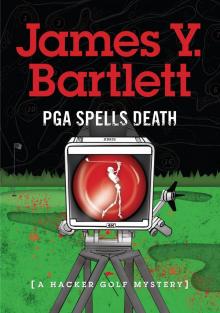 P.G.A. Spells Death
P.G.A. Spells Death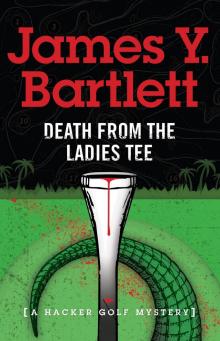 Death from the Ladies Tee
Death from the Ladies Tee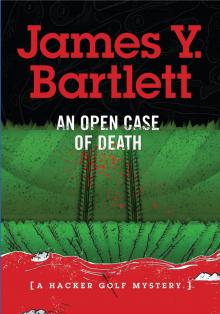 An Open Case of Death
An Open Case of Death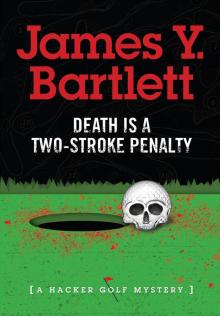 Death is a Two-Stroke Penalty
Death is a Two-Stroke Penalty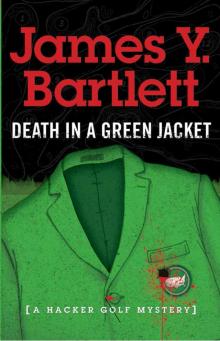 Death in a Green Jacket
Death in a Green Jacket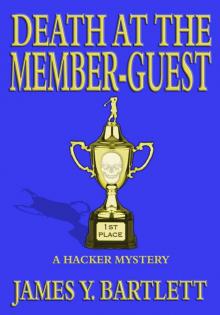 Death at the Member Guest
Death at the Member Guest